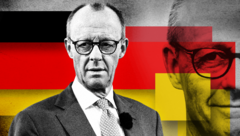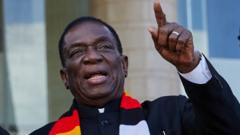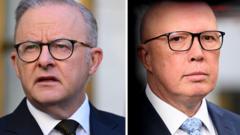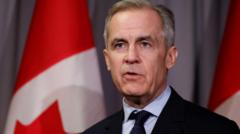As the snap federal election approaches, Friedrich Merz, once sidelined, returns to politics with a controversial flair—raising eyebrows by courting far-right votes to tighten immigration laws.
Friedrich Merz: Germany's Maverick Frontrunner For Chancellor

Friedrich Merz: Germany's Maverick Frontrunner For Chancellor
Friedrich Merz, the conservative frontrunner, navigates a politically charged atmosphere while courting the far right as he bids for Germany's leadership.
In the heart of Berlin, Friedrich Merz, known for his calm demeanor and unconventional tactics, aims to shift the political landscape of Germany as he prepares for an impending election that could see him take the reins of power.
Merz’s political ambitions were once seemingly extinguished, but he’s now the centerpiece of a potential shift in German leadership. With an unconventional strategy, he has dared to embrace far-right sentiments in a bid to sharpen the CDU's stance on immigration, diverging sharply from the centrist policies of his predecessor Angela Merkel.
This recent move, although ultimately unsuccessful in altering legislation, has stirred significant public discussion as Germany grapples with its identity and immigration policies. The criticism that he faces for courting the far-right Alternative für Deutschland (AfD) manifests in powerful protests and public unease, with former Chancellor Merkel weighing in against him—an unusual rebuttal from a leader so accustomed to political decorum.
Yet, Merz's supporters argue that he is not only acknowledging the concerns of constituents but is also trying to pull some of the electorate back from the extremes. For Merz, this approach represents a gamble—one that may potentially alienate moderate voters while appealing to those dissatisfied with the current political offerings.
Born in 1955 into a conservative family in Brilon, Merz’s early years were marked by political aspiration and traditional values. His education in law and subsequent service in parliament set the stage for a storied—but at times tumultuous—political career, which saw him stymied by Merkel on more than one occasion.
In the lead-up to the January 2025 federal elections, the seasoned politician is positioning himself as the antidote to Germany's current political misgivings. As an established lawyer turned politician, his narrative of resilience resonates with some voters who see him as a potential figure capable of restoring Germany's confidence.
However, critics remain wary of his past stances, suggesting that his approach could backfire by further legitimizing far-right ideologies in the political landscape. With a mixed reception from targeted demographics, including women and younger citizens, his pathway to power may rely heavily on coalition-building among increasingly wary partners.
As Germany stands on the brink of an election, the anticipation surrounding Friedrich Merz encapsulates a broader struggle within the nation—a desire for change amid caution against the echoes of history that far-right movements bring. Regardless of the outcome, Merz's rise may signify pivotal changes in Germany's political tapestry.
Merz’s political ambitions were once seemingly extinguished, but he’s now the centerpiece of a potential shift in German leadership. With an unconventional strategy, he has dared to embrace far-right sentiments in a bid to sharpen the CDU's stance on immigration, diverging sharply from the centrist policies of his predecessor Angela Merkel.
This recent move, although ultimately unsuccessful in altering legislation, has stirred significant public discussion as Germany grapples with its identity and immigration policies. The criticism that he faces for courting the far-right Alternative für Deutschland (AfD) manifests in powerful protests and public unease, with former Chancellor Merkel weighing in against him—an unusual rebuttal from a leader so accustomed to political decorum.
Yet, Merz's supporters argue that he is not only acknowledging the concerns of constituents but is also trying to pull some of the electorate back from the extremes. For Merz, this approach represents a gamble—one that may potentially alienate moderate voters while appealing to those dissatisfied with the current political offerings.
Born in 1955 into a conservative family in Brilon, Merz’s early years were marked by political aspiration and traditional values. His education in law and subsequent service in parliament set the stage for a storied—but at times tumultuous—political career, which saw him stymied by Merkel on more than one occasion.
In the lead-up to the January 2025 federal elections, the seasoned politician is positioning himself as the antidote to Germany's current political misgivings. As an established lawyer turned politician, his narrative of resilience resonates with some voters who see him as a potential figure capable of restoring Germany's confidence.
However, critics remain wary of his past stances, suggesting that his approach could backfire by further legitimizing far-right ideologies in the political landscape. With a mixed reception from targeted demographics, including women and younger citizens, his pathway to power may rely heavily on coalition-building among increasingly wary partners.
As Germany stands on the brink of an election, the anticipation surrounding Friedrich Merz encapsulates a broader struggle within the nation—a desire for change amid caution against the echoes of history that far-right movements bring. Regardless of the outcome, Merz's rise may signify pivotal changes in Germany's political tapestry.






















